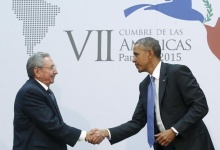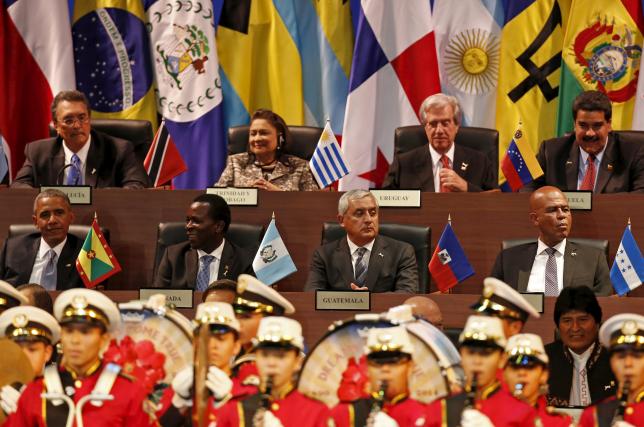www.aljazeerah.info
News, April 2015
Archives
Mission & Name
Conflict Terminology
Editorials
Gaza Holocaust
Gulf War
Isdood
Islam
News
News Photos
Opinion Editorials
US Foreign Policy (Dr. El-Najjar's Articles)
www.aljazeerah.info
|
Editorial Note: The following news reports are summaries from original sources. They may also include corrections of Arabic names and political terminology. Comments are in parentheses. |
Obama Meets With Castro and Maduro, Mending US Fences With Latin America
April 13, 2015
 |
 |
| Obama and Castro: Handshake in Pnama City, April 11, 2015 | Maduro, top right, and other Latin American leaders, Panama City, April 10, 2015 |
History now made, U.S. and Cuba face bumpy road ahead
PANAMA CITY | By Daniel Trotta and Matt Spetalnick
Sun Apr 12, 2015 5:49pm EDT
(Reuters) -
Cuba and the United States just made history. Now comes the hard part.
In the first meeting of its kind in nearly 60 years, U.S. President Barack Obama and Cuban leader Raul Castro sat down together for over an hour on Saturday at a regional summit in Panama, moving a step closer to restoring diplomatic ties.
It was the result of nearly two years of secret talks and quiet diplomacy and the mood was positive, both inside the room and out, where Latin American leaders praised Obama for ending decades of U.S. hostility toward the communist-ruled island.
Obama clearly sees Cuba as a possible success story for his policy of engaging U.S. foes.
At a time of multiple risks to his foreign policy record - from Iran's nuclear program and the war in Syria to Russian involvement in Ukraine and the violence of Islamic State - getting on well with Cuba looks relatively easy.
"The Cold War is over," Obama said. "I think there is a strong majority both in the United States and in Cuba that says our ability to engage, to open up commerce and travel and people-to-people exchanges is ultimately going to be good for the Cuban people."
Yet the gulf between the two sides remains wide, illustrated by the absence of U.S. and Cuban flags at the carefully orchestrated meeting on Saturday in a sparsely furnished conference room.
The U.S. economic embargo, which has blocked nearly all trade between the two nations for the last five decades, is firmly in place. Cuba's human rights record stills draw scorn from Washington, as does U.S. foreign policy from Havana.
"Let's not fool ourselves. We have a lot of differences," said Castro, 83, who has been an enemy of the United States for most of his life and still railed passionately against its past policies even as he praised Obama as "an honest man".
"In other words, we're willing to talk about everything with patience, with a lot of patience," added the army general and younger brother of revolutionary leader Fidel Castro.
Obama and Castro announced in December they would work to re-establish full diplomatic ties severed in 1961, reopen embassies in each other's capitals and free up trade and travel.
Restoring diplomatic relations is easy enough, requiring little more than the presidents' agreement. But normalizing overall relations could take years.
Cuba has shown no signs that it is willing to allow wider political rights. The government dismisses dissidents as mercenaries, moves quickly to stifle dissent, and Castro has made clear he does not intend to allow any relaxation of Communist Party rule.
And while Cuba is looking to draw in foreign investment, any U.S. businesses seeking to set up there need the government's blessing. Castro's government moves cautiously, as it has shown with its own market-style economic reforms in recent years.
TERRORISM LIST
In the short term, Cuba is still waiting to be removed from the U.S. State Department's list of state sponsors of terrorism, a unilateral designation that Cuba rejects as unjust.
Obama is expected to inform Congress within a few days he is taking Cuba off the list, which would free the island from some economic sanctions.
There had been some expectations that Obama would announce his intention to remove the terrorism designation and move forward on restoring diplomatic relations at the summit.
Though there is little doubt that Havana will be taken off the blacklist, U.S. officials privately have made clear that they have sought to use the timing of the move as leverage in broader normalization negotiations.
A number of unresolved issues have slowed down the process, including Washington's wish that Cuba allow U.S. diplomats to travel around the island and relax the police presence around the diplomatic mission in Havana, where visiting Cubans are closely watched.
"They're building a road, and when you're building a road you don't expect to finish right away," Brazilian President Dilma Rousseff, speaking in Panama, said of the U.S.-Cuba relationship.
Obama wants the Republican-controlled U.S. Congress to dismantle the embargo and some allies believe a coalition of Democrats and Republican free-marketeers may succeed.
It could be a long battle.
The U.S. president has already used his executive powers to ease travel restrictions to Cuba, and allow U.S. importers to buy goods from independent Cuban contractors and exporters to ship building materials to private Cuban companies.
He has so far used those powers sparingly, however, and Cuba would like him to go further.
"President Obama retains ample executive authority ... to eliminate the embargo," said Foreign Minister Bruno Rodriguez.
U.S. officials acknowledge Obama can ease more restrictions on his own, within limits, but they are waiting to see the results of the latest changes before deciding future measures.
While Cuba is keen to reopen embassies and see more U.S. sanctions lifted, U.S. officials say the communist government appears intent on moving slowly toward full normalization, fearful that a quick opening in areas like travel, trade and Internet access might loosen its grip on Cuban society.The meeting between Obama and Castro was marked by what one U.S. official described as a spirited back-and-forth over issues that divide them, including human rights and press freedoms.
"There wasn’t tension," the official said, adding that there were also "lighter moments" when the leaders marveled at how unimaginable such a meeting would have been not long ago.
(Reporting by Daniel Trotta, Matt Spetalnick, Dave Graham and David Alire Garcia; Editing by Kieran Murray)
***
Obama meets Venezuela's Maduro at time of high tensions
Sat Apr 11, 2015 10:13pm EDT
PANAMA CITY
(Reuters) -
U.S. President Barack Obama met Venezuelan President Nicolas Maduro privately at a regional summit on Saturday and tried to ease tensions that surged after the United States recently placed sanctions on Venezuela.
Maduro had earlier challenged Obama to discuss his decision to sanction seven Venezuelan officials, saying in a speech to the summit in Panama that he had been trying to arrange a meeting with Obama for two years but never received a response.
Obama was not present at the time but the two later met. A Venezuelan government spokeswoman said they greeted each other in Spanish and had a respectful conversation.
A U.S. official said it was a brief conversation just as Obama was leaving for his return to the United States.
"President Obama indicated our strong support for a peaceful dialogue between the parties within Venezuela. He reiterated that our interest is not in threatening Venezuela, but in supporting democracy, stability and prosperity in Venezuela and the region," said Bernadette Meehan, a National Security Council spokeswoman.
The U.S. government last month ordered sanctions against the seven officials, including the head of state intelligence service and the director of the national police force, saying they had committed acts of violence or abused human rights.
The sanctions included blocking or freezing their property and interests in the United States and denying them entry into the country.
The U.S. government also said Venezuela was a national security threat, a claim that drew criticism from several Latin American governments.
U.S. officials later tried to downplay the security threat designation, but the issue nonetheless hung over the weekend summit that was dominated by Obama's historic meeting with Cuban President Raul Castro, Maduro's closest ally.
(Reporting by Daniel Trotta and Matt Spetalnick)
***
Share this article with your facebook friendsFair Use Notice
This site contains copyrighted material the
use of which has not always been specifically authorized by the copyright
owner. We are making such material available in our efforts to advance
understanding of environmental, political, human rights, economic,
democracy, scientific, and social justice issues, etc. We believe this
constitutes a 'fair use' of any such copyrighted material as provided for
in section 107 of the US Copyright Law. In accordance with Title 17 U.S.C.
Section 107, the material on this site is
distributed without profit to those
who have expressed a prior interest in receiving the included information
for research and educational purposes. For more information go to: http://www.law.cornell.edu/uscode/17/107.shtml.
If you wish to use copyrighted material from this site for purposes of
your own that go beyond 'fair use', you must obtain permission from the
copyright owner.
|
|
|
|
||
|
||||||


